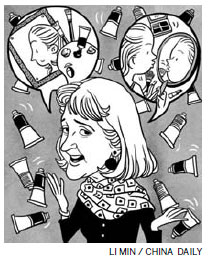Painting a pretty picture when it comes to speaking Chinese
By Lisa Carducci ( China Daily ) Updated: 2012-05-03 09:47:29
 I am a self-made woman in several fields: baking wonderful cakes; recycling Christmas cards; growing tomatoes in pots on the balcony; embroidering such a huge wedding trousseau when I was a girl that I had enough for three generations; repairing leaking pipes; adding a telephone on a house line; and learning languages.
I am a self-made woman in several fields: baking wonderful cakes; recycling Christmas cards; growing tomatoes in pots on the balcony; embroidering such a huge wedding trousseau when I was a girl that I had enough for three generations; repairing leaking pipes; adding a telephone on a house line; and learning languages.
Take Chinese, for instance. As I preach to others: Don't wait to be perfect in a language before you start to use it. This is what I did more than 20 years ago. Now, I always manage to make myself understood, though my language may not be perfect.
I am also a self-taught artist. My first painting in 1978 was a disaster. Of course, it could not have been a success, as I had chosen to draw a portrait of my daughter in watercolors, which didn't allow for any correction - unlike oils.
It took me another 10 years before I tried again. I've stuck to oil painting since.
Several Chinese artists who graduated from art schools encouraged me to continue. They said my style was free from the strict rules they were taught to follow, and now that they have become autonomous, they often find it difficult to free themselves and create their own styles.
However, I am not good at painting portraits and don't even want to try for the moment. I have enough problems painting human faces that don't have to resemble anyone specifically.
The years 1988 and 2012 may be considered as the most productive periods of my painting career.
Recently, needing to restock my painting materials, I went to an art store. Upon seeing me, two idle vendors stopped chatting and asked what I wanted to buy. "Hua lian yanse," I said.
As a good Italian, I always use my hands when I speak, so I probably gestured and pointed to my own face - which didn't help - when asking for what were literally "colors for painting the face".
As Chinese do when they find themselves in an uneasy situation, the two women spontaneously blushed. I thought about how I would paint a blushing person.
In the meantime, one lady answered: "Duibuqi, women jiu mai hua hua'r de cailiao." (Sorry, we sell only painting materials here.)
It took me 1.5 seconds to understand where the problem lay. Hua lian means "to paint the face", which is synonymous with "huazhuang", or "to make up" your face.
Sure enough, I knew they didn't sell cosmetics at the store. And I learned from my mistake that I had misused a word.
Strangely, at that moment, what came to my mind was what kind of materials do Peking Opera artists use when they perform "painted face" roles, and what would happen if a person used paint for walls on their skin?
All this happened in a fraction of a second.
I came back to reality, and in order to clear up the ladies' uneasiness, I asked them to teach me what I should have said. "Pifu se, pifu yanliao", they suggested.
|
|
|
|
|
|
|
|


























 Raymond Zhou:
Raymond Zhou: Pauline D Loh:
Pauline D Loh: Hot Pot
Hot Pot Eco China
Eco China China Dream
China Dream China Face
China Face






